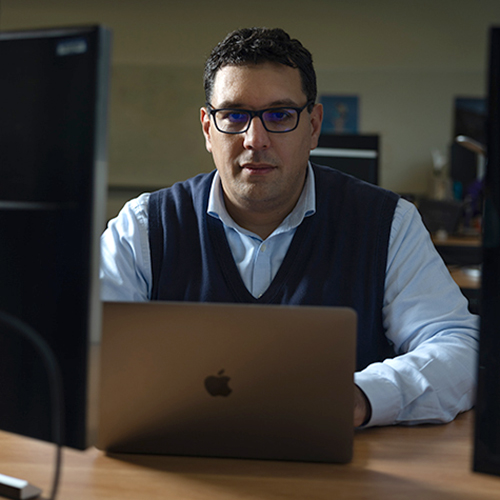Faculty and units across the College of Arts & Sciences Social Sciences Division engage with Artificial Intelligence (AI) as a tool in their research, and sometimes in the classroom. Some faculty also focus on understanding the societal impacts of AI technologies as they are developed and implemented globally, including their impacts on student learning, ethics issues imbedded in AI development and applications, and other topics. The following are examples of research projects and courses involving AI in some way.
AI technology as a tool for data-intensive research
Societal impacts of AI technologies
AI technology across the globe
AI in the classroom: pedagogy research; AI-related courses
Feature stories about AI in the Social Sciences
AI technology as a tool for data-intensive research
Tyler McCormick (Sociology, Statistics, and CSSS) makes use of several AI technologies in his research on global health methodologies and decision-making under uncertainty. He is a faculty partner of Responsible AI Systems & Experiences (RAISE) in the UW Information School.
Chris Adolph (Political Science, Statistics, CSSS) pursues research in political economy and comparative politics that explores how political institutions and interests jointly determine public policies including monetary policy, fiscal policy, health policy, and trade policy. In collaboration with faculty in UW Global Health, he recently published “High Resolution mapping of Essential Maternal and Child Health Service Coverage in Nigeria: A Machine Learning Approach” (BMJ Open).
Zach Almquist (Sociology) conducts research on the development and application of mathematical, computational, and statistical methodology — including AI tools — to better understand the problems and theories of social networks analysis, demography, education, homelessness, and environmental action and governance. He also regularly teaches courses on AI and data science methods, the societal impacts of AI/Data science use, and computational social Science more generally.
In the Department of Anthropology, faculty in Biological Anthropology are exploring the use of AI tools for genomic analysis. Faculty in Archaeology are exploring data analysis techniques — for both material artifacts and textual records — that incorporate artificial intelligence tools.
In the Department of Economics, faculty are incorporating machine learning techniques into their research in econometrics and computational finance, including Yu-Chin Chen, Yanqin Fan, and Eric Zivot.
Societal Impacts of AI technologies
Bo Zhao (Geography) studies the social implications and ethical aspects of emerging geospatial technologies. His recent projects leverage these technologies to advance social inclusion and justice, especially for vulnerable groups such as refugees impacted by climate change, LGBTQ+ communities in challenging environments, and Black communities disproportionately affected by COVID-19. Zhao’s current research in “Deepfake Geography” encourages scholars to develop advanced strategies to effectively tackle the intricate societal challenges arising from geographical misinformation generated by Geographic Artificial Intelligence (GeoAI) in today’s “post-truth” era.
Wang Liao (Communication) explores how people interact and build relationships with artificial-intelligence agents (‘bots’).
The Community Data Science Collective (CDSC), an interdisciplinary research group housed in the Department of Communication, focuses on how the design of communication and information technologies shape fundamental social outcomes with broad theoretical and practical implications. Examples of faculty within this group whose research considers, in part, the impacts of artificial intelligence technologies:
Ben Mako Hill (Communication) studies the social dynamics that shape online communities engaged in the peer production of digital public goods, such as Wikipedia and Linux. This includes the role of AI tools in the production process. Hill is a faculty associate at the Berkman Klein Center for Internet and Society at Harvard University.
Anis Rahman (Communication) is currently looking at digital authoritarianism and its resistance; public internet and AI; media and geopolitics; and platform regulation in South Asia.
Katy E. Pearce (Communication) researches social and political uses of technologies and digital content in non-democratic contexts, specifically in the semi- and fully-authoritarian states of the former Soviet Union. Her current research areas include digital divides and inequalities; the affordances of information and communication technologies for social and opposition movements; and online impression management.Adrienne Russell (Communication), co-director of the UW's Center for Journalism, Media, and Democracy, conducts research focused on emerging technologies and pressing social problems, with an eye toward how to foster democratic and participatory publics. Her most recent book, The Mediated Climate (Columbia University Press 2023), explores the overlapping climate and information crises, with consideration of emerging AI technologies.
AI technology across the globe
Scott Radnitz (Jackson School of International Studies, and faculty member in the Center for an Informed Public) is an expert on conspiracy in Russia, and his work investigates the role of AI technologies in the generation and spread of and mis/dis-information.
Mary Callahan (Jackson School of International Studies) is a renowned researcher of Myanmar; her research includes analysis of the deployment of AI technologies and information flows in Southeast Asia.
Kavita Dattani (Gender, Women & Sexuality Studies), a feminist researcher of digital technologies and data, currently focuses on the emergence and development of dating apps in India. Her work seeks to uncover the ways in which data-driven digital technologies are enabling new kinds of digital life. AI tools are an important focus of her analysis.
Sebastián Rubiano-Galvis (Law, Societies & Justice) explores the risks of using predictive policing tools to surveil illegal gold mining in the Colombian and Peruvian Amazon.
Margaret O’Mara (History) has written extensively on the development of Silicon Valley in the US .
Jessica Beyer (Jackson School of International Studies) has a strand of research that explores the variety of international regimes for regulating cybertechnologies and spaces, including AI.
AI in the Classroom
Research on AI and pedagogy
Ian Schnee (Philosophy) is part of a cross-disciplinary research cluster, funded by the Simpson Center for the Humanities, that focuses on generative AI tools in relation to writing pedagogy.
Several faculty in the Social Sciences Division, including Rawan Arar and Ann Frost (both in Law, Societies & Justice) are participating in the Evidence-Based Teaching groups focused on AI in the classroom — a two-year initiative from the UW Center for Teaching and Learning. In addition, Ann Frost is a member of the Generative AI working group of the Faculty Council for Student Affairs. The working group is studying how AI impacts our students and classrooms.
Courses with an AI focus
The Data Science Minor initiative, a campus-wide initiative overseen by Ben Marwick (Anthropology), has supported the development of several undergraduate courses that include consideration of AI technologies and critical engagement with the social and methodological impacts of these developments.
Tyler McCormick (Sociology, Statistics, and CSSS) teaches a graduate course in machine learning for the social sciences,
Zach Almquist (Sociology) regularly teaches courses on AI and data science methods, the societal impacts of AI/Data science use, and computational social science more generally.
The Center for Statistics and the Social Sciences offers courses to train graduate students throughout the social sciences in statistical learning and machine-learning techniques, including:
- “Artificial Intelligence and Machine Learning and their Applications in the Social Sciences” Autumn 2024, taught by Tyler McCormick (CSSS, Political Science, Statistics).
- “Multivariate Data Analysis for the Social Sciences” offered annually since 2002, and covering several machine learning techniques, especially as used in Sociology. Taught by (CSSS, Statistics, Social Work) and Sasha Johfre (CSSS, Sociology).
- “Statistics and Philosophy of Voting” which covers the role of machine learning in modern gerrymandering. Taught by Elena Erosheva (CSSS, Statistics, Social Work), Marina Meila (Statistics), and Conor Mayo-Wilson (Philosophy).
Clair Yang (Jackson School of International Studies) teaches Political Development of Digital Technology, including artificial intelligence, with a focus on the tech industry in China. She actively uses AI tools in her courses.
Sebastián Rubiano-Galvis (Law, Societies & Justice) teaches “Science, Technology, and Justice,” an undergraduate course that addresses the justice dimensions of AI.
Margaret O’Mara (History) teaches undergraduate history courses that situate today's debates about digital technologies and platforms, including artificial intelligence, in a longer political, social, and economic perspective.
Debamanyu Das (Jackson School of International Studies) teaches courses on the global political economy of technology, looking at the social and political impacts of technology development and using machine learning both as an object of study and as a research tool.
Jessica Beyer (Jackson School of International Studies) teaches courses on cybersecurity and mis/dis-information, including AI.
The Department of Philosophy is in the early stages of developing a set of undergraduate courses that will grapple with ethical dimensions of AI development and use. Drawing on the department's twin strengths in philosophy of science and ethics, these courses aim to provide a rigorous framework for better understanding AI tools and their implementations and critical reflection on the impacts of the technologies. This effort will be led by Stephen Gardiner, Carina Fourie, Ben Feintzeig, Conor Mayo-Wilson, and Carole Lee.
Stories about AI in the Social Sciences

A Statistician Weighs in on AI
Statistics professor Zaid Harchaoui, working at the intersection of statistics and computing, explores what AI models do well, where they fall short, and why.

Working Toward Responsible AI
Artificial intelligence (AI) is an essential tool at Indeed, a global job-matching and hiring platform. Trey Causey (2009) works to ensure that the company's AI promotes equity and fairness.
